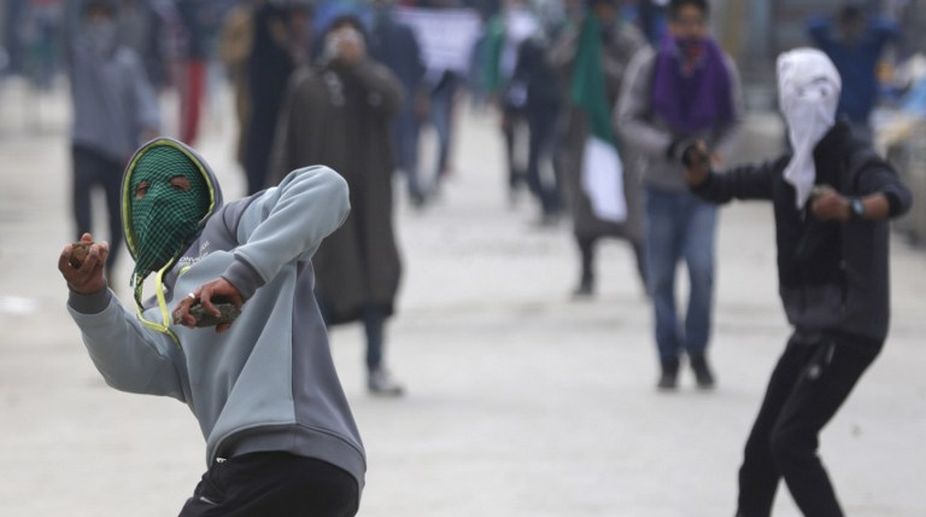Congress, allies sabotaged Jammu’s national projects: Dr Jitendra Singh
The minister further alleged that the Congress also denied 4% reservation to the people living along the International Border in this region.

PHOTO: AFP
Before partition of the Indian sub-continent in 1947, the state of Jammu and Kashmir, located in the northern most corner, adjoining Central Asia and Tibet had a population which was 80 per cent Muslim. Now the Indian state of Jammu and Kashmir has 68 per cent Muslim population – the rest are mainly Hindus Buddhists and Sikhs.
Hindus are dominant in the Jammu region, Buddhists in Ladakh and Muslims are dominant in Kashmir (almost 99 per cent after the exodus of the Pundits who made up nearly five per cent of the population prior to the exodus). Each of these religious and ethnic groups of J & K have their own cups of joy and sorrow – their own share of good or bad luck.
First let me discuss the good and bad luck of the non-Muslims. I consider them extremely lucky since by a strange chain of events in 1947-48, fate allowed them to remain with India. Had there been no Maharaja in Jammu and Kashmir and had it been a part of British India, the entire state of J&K from Gilgit to Lakhanpur would have automatically merged with Pakistan. The Maharaja saved them by signing on the accession treaty. In the normal course they would have faced a disaster. Everyone knows that most Muslim nations, particularly Pakistan, do not have an admirable track record of protecting minorities.
Advertisement
Most of the Punjabi Hindus and Sikhs, Sindhi and Baluchi Hindus , Bengali Hindus had to seek shelter in India in millions. Even the Kashmiri Hindus were thrown out from their homes but luckily for them, they got 43 years time and half of their state was still available for their relocation. The Jammu Hindus were very lucky that they did not have to relocate after the huge upheaval in the sub continent. For this great favour they have to thank their fate first and then the Maharaja.
The Hindus and Sikhs of Pakistan Occupied Kashmir were both lucky as well as unlucky. Unlucky, because they had to leave their hearths and homes, and lucky because they had Jammu next door to settle down again.
The major sorrow for Jammuites is that they have very little political and bureaucratic clout. That they have very little clout is apparent from the fact that the state civil service is called Kashmir Administrative Service and not J & K Administrative Service; All India Radio Jammu is called Radio Kashmir; no Hindu or Sikh was ever allowed to head the state government, and of the 87 assembly constituencies, the Hindus are in an important position in less than 30 constituencies.
The Muslims dominate 57 out of 87 constituencies and naturally the state government will always remain under the thumb of Muslim-oriented parties like the National Conference or PDP. The Hurriyat Conference does not participate in elections. Had they participated, they would have also been dominant in the government even if they had been parrots of our enemy.
In such a scenario, it is but natural that Jammu ministers and bureaucrats, specially if they are non-Muslims, do not get their rightful share in government and in portfolios. The coveted portfolios, like Home, Planning, Finance, Agriculture etc. are usually not earmarked for them. Exceptions, of course, were sometimes there. Devi Das Thakur had been Finance minister in Sheikh Abdullah’s cabinet.
But even as Deputy Chief Minister from the Congress party, Mangat Ram Sharma was allotted only Industries and Transport which were considered relatively unimportant. Sharma had told me privately, after the allotment of portfolios, “Humein mehkumey kuchh naram miley hain” (I have got soft portfolios). He was a bit disappointed.
Even the present Deputy Chief Minister, from Jammu BJP, does not have A-plus category departments. I don’t know about his satisfaction or dissatisfaction because when I knew him he was a Reader in the university.
Now let us discuss the fate of the Muslims in J & K. In normal circumstances they should have been in the grip of army dictators of Pakistan. They would have not known the flavour of democracy and secularism and an impartial Supreme Court. They would have been deprived of human rights like the people of Balochistan/Sindh. It is their good fortune that India took them under its benevolent democratic umbrella.
Unfortunately they do not realise this and they cannot integrate themselves with India mentally. They feel that it is their misfortune that destiny has thrown them on the wrong side of the international border. The recent expressions of religious bigotry by a large number of Hindus in northern and western India has unnerved them. Immature statements of our army generals and the Defence Minister have frightened them. They feel that the Indian armed forces are terrorising them…… their freedom fighters (whom Indians call terrorists) are being brutally massacred. That is their cup of sorrow. How much of that is genuine and how much of it is unjustified only history will determine, because Pakistan and India have not yet arrived at an amicable settlement on this issue. We can only pray that all misunderstandings are removed and the Kashmiris can live with dignity and honour within the framework of India.
Indo-Pak talks must go on continuously without any third party interference. My personal opinion is that the cup of sorrow for the Muslims of J & K will be emptied if India recognises POK as a part of Pakistan, Pakistan recognises Ladakh and Jammu as an integral part of India, and India recognises Kashmir valley as an autonomous region under her own benevolent umbrella.
The writer, a retired IAS officer, is former Financial Commissioner, Jammu and Kashmir.
Advertisement